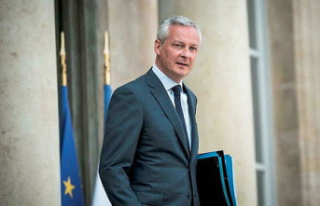The RATP has planned almost normal traffic for metros, buses and trams on Wednesday March 15 but a "very disrupted" RER service for the eighth day of interprofessional mobilization against the pension reform. The mobilization seems to be marking time at the RATP, affected by a renewable strike since March 7 at the call of the inter-union (CGT, FO, Unsa, CFE-CGC). Traffic will thus be normal on Tuesday March 14 on the entire network with the exception of the RER, which is still "disturbed".
The inter-union had however called Thursday to "continue the pressure, on the government and the parliamentarians, by registering in the call of the national inter-union" by the demonstration Saturday but also by the strike Wednesday, day of meeting of the Joint Joint Committee (CMP) in Parliament, before a possible final vote on the text on Thursday.
After a well-monitored first day of strike last Tuesday at the RATP, the movement very quickly decelerated and, from Friday, traffic was again normal or almost in the metro and on the surface, as throughout the weekend. Only the RER is experiencing more or less pronounced disturbances. On Tuesday, there will be three out of four trains on line A and two-thirds of the trains will run on RER B.
The strike will also affect port areas. The CGT called Monday for three days of work stoppage in the ports of France, with a day "dead ports" in conclusion Thursday, to fight against the reform. "We are not here to block the economy, we are here to obtain the withdrawal of the project", launched during a press conference in Martigues, near Marseille, Serge Coutouris, deputy secretary general of the National Federation CGT of ports and docks.
"Thursday, throughout the day, nothing comes in and nothing comes out" of the ports, he assured, recalling that the CGT was the majority in all the ports of France except that of Dunkirk. At his side, several representatives of the CGT of Bouches-du-Rhône, and in particular the general secretary of the union in the department, Olivier Mateu, promised an "amplification" and a "diversification" of the movement to fight against the pension reform , especially if the government used Section 49.3 of the Constitution to push it through.
"It is up to the government to keep things within a republican and democratic framework, if there is 49.3, inevitably it will change the conditions of the conflict", declared Olivier Mateu: "if the government uses 49.3, there will be no no more rules for anyone". Mr. Mateu also welcomed the "renewable strike of the employees" of Fluxel, operators of the Fos and Lavéra oil terminals, which provide the connection between the tankers and their customers in the port.
"If we had any advice for the government, it would be to withdraw the reform as soon as possible, and if we had any advice to give to comrades who get up in the morning to go to work, it would be to fill up, because that won't last forever," he said.
After the green light on Saturday from the Senate in favor of the project, the government is hunting for votes in the Assembly to succeed in having its project adopted without resorting to Article 49.3 of the Constitution. The negotiations will notably continue on Wednesday, a new day of mobilization in the streets, in a joint joint committee (7 deputies and 7 senators), in the hope that the National Assembly and the Senate will reach an agreement, which will then have to be validated Thursday.












